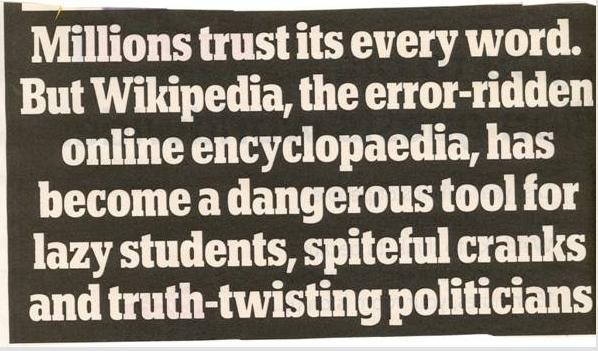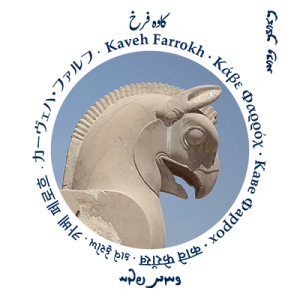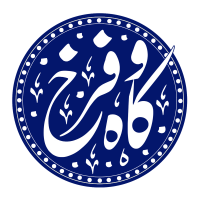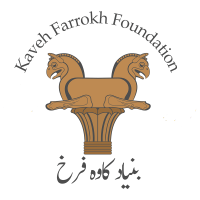The title of the article by Jonathon Margolis of the Daily Mail on February 15th, 2009 succinctly states the danger:
Wicked-Pedia! Millions trust its every word. But Wikipedia, the error-ridden encyclopaedia, has become a dangerous tool
This quote from Margolis is also revealing:

Iranian history is now a MAJOR target by those who harbor politicaly-motivated agendae. Unfortunatley, it is also a venue for a number of historians and their students (interestingly in the Iranian Studies field) who wish to change the history and legacy of Iran. There are also powerful lobbies of pan-Turks and pan-Arabo-Islamists who often insert anti-Iranian propaganda into the Wikipedia. Examples of these actions will be discussed below.
Wikipedia: The case of attacks against Cyrus the Great
Saam Safavi-Zadeh and Anna Djakashvili-Bloehm had also warned in the early part of 2009 of the dangers of Wikipedia being used by Eurocentrists (or neo-Orientalists) in their efforts to attack the character of Cyrus the Great and the Cyrus Cylinder.

The Cyrus Cylinder. The wikipedia has been used as a venue by Eurocentric or neo-Orientalists in an attempt at presenting the Cylinder and Cyrus the Great in a more negative light.
There is now evidence that the Spiegel and Daily Telegraph’s racist articles against Cyrus the Great last July were closely coordinated with efforts on Wikipedia against Cyrus the Great. Safavi-Zadeh and Djakashvili-Bloehm note the following in their article:
“…Note 19 in the Wikipedia article which links to: http://www.livius.org/ct-cz/cyrus_I/cyrus_cylinder.html… it is very curious that the above occurred right after the Spiegel/Daily telegraph articles on July15-21.”
The Livius.org link mentioned by Safavi-Zadeh and Djakashvili-Bloehm states that the entire history of the Cyrus Cylinder being associated with Human Rights is all “imperial propaganda of Shah Mohammad Reza Pahlavi“.
This is exactly what the Spiegel and Daily Telegraph articles said in their aforementioned articles. There are other parallels between Wikipedia and the Spiegel-Daily Telegraph as cited by Safavi-Zadeh and Djakashvili-Bloehm in their article.
Perhaps most remarkable are the tactics that are being used by Orientalist or Eurocentrist students, professors and lay-persons against Iranian history (in this case the history of Cyrus the Great). Safavi-Zadeh and Djakashvili-Bloehm cite the following tactics:
1) Ignoring or sidelining any references or researchers that contradict them (including character assassination)
2) Using (or recruiting) as many sympathetic Wikipedia users as possible to enforce a point of view
3) Tireless repetition of particular viewpoints
The good news is that academics are now alert to the fact that Wikipedia has become unreliable, especially in topics related to the Humaities, Social Sciences, History and biographies of persons. Margolis notes that:
One, Professor Tara Brabazon of the University of Brighton, has explicitly banned first-year students from using Wikipedia – or Google – and insists on them sticking to reading lists.
Too many students don’t use their own brains enough,’ she says. ‘We need to bring back the important values of research and analysis.’
Other colleges have followed suit not only here in Britain but also in America, where the University of Pennsylvania in Philadelphia, the University of California in Los Angeles and Syracuse University in New York have all banned the use of Wikipedia as a source for material.
Wikipedia and attacks against Professor Richard Nelson Frye
The TalkPage section of the Wikipedia link for Professor Richard Frye has become a virtual battleground. This doyen of Iranian Studies has been accused of being “an Iranian secular nationalist“, a characterization which is unfair, unbalanced and misleading. This is because Professor Frye quotes Arab historian Ibn Khaldun’s observations on the mighty influence of Persian culture on Arabo-Islamic civilization (see article by Kaveh Farrokh on pan-Arabism).

Professor Richard Frye has also witnessed incisive comments against him in Wikipedia. As noted by Safavi-Zadeh and Bloehm “Wikipedia forums are not monitored or refereed by qualified academics on a full-time basis. Any person (objective or otherwise) can open an account in Wikipedia, enter themselves into any topic and start writing or revising that topic. ”
The frustration against such abusive tactics is duly expressed by a Wikipedia editor who often monitors the actions of revisionists against Iranian history topics and personalities:
“Wikepdia is a big headache.. specially countries that do not have a history will find a perfect way to make history and will actually pay editors and organizations to support their edits …”
Examples of abuse cited by the Daily Mail
At this time any historical item and any person (living or deceased) can easily be targeted for character assasination and ridicule via Wikipedia. Note the following four examples cited by Margolis:

Former British Prime Minister Tony Blair was attacked on Wikipedia when he was falsely accused of having pictures of Adolf Hitler in his room as a teenager. The writer of this false accusation cannot be bought to account thanks to complex Wikipedia forum rules.

Sacha Baron Cohen, the famous comical character of “Borat” who was cited as the president of Kazakestan in Wikipedia.

Former US Presdient George Bush has had his entry changed 40,000 times due to false claims being continually posted against him. As noted by Safavi-Zadeh and Djakashvili-Bloehm, abusers in Wikipedia often rely on “tireless repetition” to enfore their points of view.

David Beckam has been described in Wikipedia as an 18th century Chinese goal-keeper. It is perhaps no exaggeration to state that any person can now open an account in Wikipedia and write whatever she or he wishes to write against any other topic or person.

Cartoon showing the anguish of “Gary” seeing his information distorted on Wikipedia. Margolis as well as Safavi-Zadeh and Djakashvili-Bloehm have worked hard to expose the maladaptive processes now seen in the Wikipedia venue.



